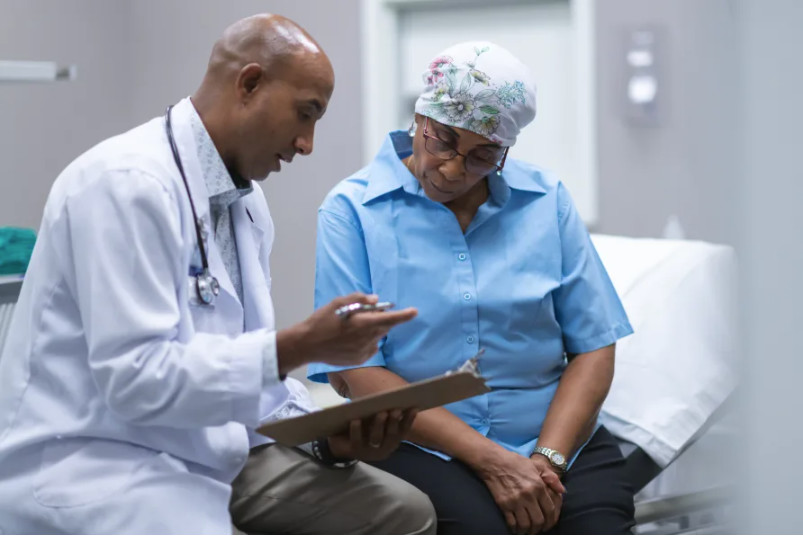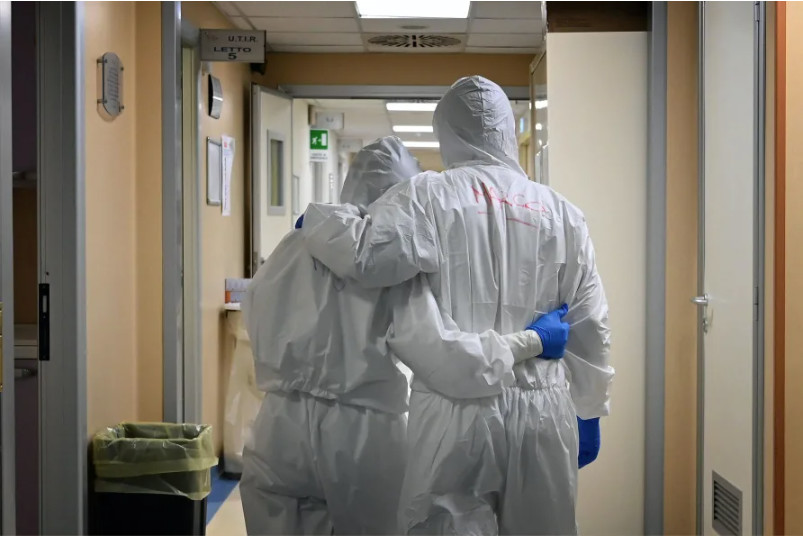
Health & Medicine
Distress doubles for cancer patients during pandemic

With looming workforce shortages, a new study finds a comprehensive approach to ensuring the wellbeing of cancer healthcare workers is essential
Published 24 November 2023
Three years into the pandemic and as Australia’s case numbers rise, healthcare providers are still working tirelessly to safeguard vulnerable patients, often at a personal cost.
Pandemic pressures have led to an increase in distress and burnout among healthcare providers, with implications for the entire healthcare system.

We are facing a dangerous shortage of healthcare workers, with the World Health Organization predicting a shortfall of 10 million healthcare providers by 2030. Australia alone faces a critical shortage of over 100,000 nurses and 2700 doctors within the next three years.
These statistics are alarming but not surprising, especially to those in the blood cancer community where the pandemic’s impact continues to be felt. But awareness of ongoing distress and actions to alleviate this distress remain insufficient.

Health & Medicine
Distress doubles for cancer patients during pandemic
In Australia, blood cancers are the third most commonly diagnosed cancer and the second leading cause of cancer-related deaths, claiming more lives each year than breast or skin cancer.
The challenges blood cancer patients face have been exacerbated by the pandemic. Their immunocompromised state makes them highly susceptible to COVID-19, however vaccines are less effective. These challenges are impacting their everyday lives, leading some to call them the “Prisoners of the Pandemic”.
Although the pandemic’s impacts on blood cancer patients have rightly gained attention, there has been little focus on the healthcare providers responsible for their care.
As the pandemic gripped the world and the number of infections and deaths rose daily, healthcare providers faced significant challenges. Australia alone has seen over 11 million COVID-19 cases and a death toll of 23,289. These are not mere statistics; each number represents an individual with a family and life story.

And because the risk of infection and mortality is much greater in immunocompromised patients than for average COVID-19 patients, the burden of protecting vulnerable individuals from life-threatening infections is acutely experienced by healthcare providers in the blood cancer space.
Recognising the impact of COVID-19 on blood cancer care delivery and the workforce, our team conducted in-depth interviews with healthcare providers across the country.

Business & Economics
How are Australia’s doctors faring during COVID-19?
Our study included twenty-one Australian nurses, physicians, and allied healthcare workers. The results, published in the journal Psycho-Oncology, shed light on the burdens faced by these providers.
The initial stages of the pandemic were described as unsettling and providers experienced uncertainty and fear as they had to act quickly with changing guidelines. As one social worker said:
“It did feel at times like somebody was saying, run this way. No, hang on a second. No, we’re not going that way. Turn around, go back the other way.”
Providers also grappled with moral dilemmas as they navigated stringent rules and were forced to make decisions on the risks and benefits of potentially immunosuppressive treatment for blood cancer patients.
A haematologist shared:
“People who were exposed couldn’t come for their chemo for, people who, potentially at the most traumatic event could have died … it was all just the strict rules and no wriggle room.”

As the pandemic unfolded, providers reflected on the emotional toll the pandemic had taken on their own wellbeing, leading to burnout, fatigue and increased tension in the workplace. They spoke of the violation of professional boundaries, as a nurse highlighted:
“People’s expectations became more, they thought we were all more readily accessible … boundaries were crossed a lot in terms of they expected things outside of normal business hours … even your work colleagues wouldn’t respect those boundaries. Today, someone on the switchboard put through a phone call from a different department to my personal mobile.”
Existing support initiatives were viewed as inadequate “Band-Aid” solutions. A nurse consultant expressed this frustration:

Health & Medicine
Taking on blood cancer - actively
“Giving me a free cup of coffee … it didn’t mean that much to me.”
Another nurse added:
“The Employee Assistance Program, and all the broadcasts about staff wellbeing and online Zumba classes were a load of bollocks.”
A haematologist emphasised the need for more staffing, saying:
“More recently, every health worker in this hospital is going to get a $3000 payment. And that made me really angry too. I don’t want that $3000 payment, I want admin to actually listen to the fact that we need more staff.”
Providers also expressed concerns about the ongoing isolation and treatment challenges faced by blood cancer patients following the vaccine rollout, adding to their emotional burden. As a haematologist highlighted:
“The cost is, our patients actually being more vulnerable, having to educate them about staying safe, whereas most of the general population are not doing so.”

A cycle of reduced staffing and increased workloads pushed some providers to question the personal cost of their dedication. A haematologist shared:
“I think a lot of healthcare professionals will just turn around and go and look for work-life balance. I think it does make them stop and think, ‘Why am I busting a gut so hard for this?’”
A nurse added:

Health & Medicine
The world needs nurses now more than ever
“I think staffing is almost at the worst level we’ve been through the pandemic now. And it’s because I think we’ve had the mass resignation … which is putting a lot of load on those of us who haven’t been able to.”
Our study reveals the unaddressed challenges faced by healthcare providers of blood cancer patients.
To ensure the wellbeing of these dedicated professionals, especially with the looming workforce shortage and increasing pressure on cancer care, a comprehensive approach is essential.
Local healthcare organisations need to look beyond monetary incentives and engage providers in creating workplace cultures that ensure working in cancer care is not only sustainable for individuals but also appealing to new generations.
Studies also show that healthcare providers prefer to receive support from their peers rather than mental health practitioners. Peer support is known to improve care and sustain professionals and has also been shown to be beneficial for addressing moral distress.

We encourage organisations to recognise the importance of connection and community and implement healthcare provider-led peer support programs.
This is a very basic and preliminary step health leaders can start actioning now. Protecting the future of the cancer workforce requires a coordinated effort involving department heads, hospitals and governments.
Investing in cancer healthcare providers is an investment in patient care and outcomes. It is time to prioritise the wellbeing of these dedicated professionals who ensure a healthier future.
Banner: Getty Images